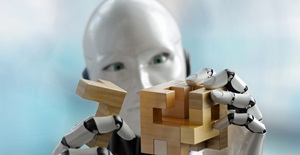Out-Law News 3 min. read
Concept of AI inventor rejected in Australian patent ruling
14 Apr 2022, 3:50 pm
Artificial intelligence (AI) systems cannot be inventors under Australian patent law, some of the country’s most senior judges and intellectual property (IP) law experts have unanimously agreed.
The five-judge bench of the Federal Court of Australia held that only a natural person such as a business or individual can be an inventor under Australia’s Patents Act and Patents Regulations.
The effect of the ruling is that AI systems cannot be listed as inventors on patent applications on Australia. However, the Court said its judgment does not exclude the possibility that inventions devised by AI systems are capable of being granted patents.
The concept of AI inventorship was considered by a full bench of judges at the Federal Court after Australia’s commissioner of patents challenged an earlier ruling by Justice Beach who had held that none of the provisions of patent law “exclude an inventor from being a non-human artificial intelligence device or system”.
The enlarged panel who heard the appeal included the Chief Justice Allsop and two of the most senior IP judges in Australia, Justices Nicholas and Yates, as well as patent specialist Justice Burley and Justice Moshinsky, who is on the IP National Practice Area panel. Ahead of the appeal hearing, patent law experts at Pinsent Masons said it would be “the largest sitting of specialist IP panel judges to consider the question of AI inventorship yet”.
In the case before the court, US scientist and technologist Dr. Stephen Thaler had argued that he was entitled to the assignment of patent rights from inventions generated by ‘DABUS’, a machine he developed. However, the Federal Court found that “the statutory language, structure and history of the Patents Act, and the policy objectives underlying the legislative scheme” means that it is only possible for a natural person to be named as an inventor within the statutory regime, meaning DABUS cannot be considered an inventor and is therefore unable to be granted any patent rights for its outputs nor assign such rights to Thaler.
The judges said: “[i]t is not to the point that Dr Thaler may have rights to the output of DABUS. Only a natural person can be an inventor for the purposes of the Patents Act and [Patent] Regulations. Such an inventor must be identified for any person to be entitled to a grant of a patent under [the legislation].”
The Court went on to say that the idea that “no invention devised by an artificial intelligence system is capable of being granted a patent” does not necessarily follow from a finding that DABUS is not an inventor.
Five-judge bench
Federal Court of Australia
The Court must be cautious about approaching the task of statutory construction by reference to what it might regard as desirable policy, imputing that policy to the legislation, and then characterising that as the purpose of the legislation
The judges further agreed that the case had raised “many propositions … for consideration in the context of artificial intelligence and inventions” and left the door open for policymakers and legislators in Australia to address those issues, rather than the courts.
Those propositions “…include whether, as a matter of policy, a person who is an inventor should be redefined to include an artificial intelligence. If so, to whom should a patent be granted in respect of its output? The options include one or more of: the owner of the machine upon which the artificial intelligence software runs, the developer of the artificial intelligence software, the owner of the copyright in its source code, the person who inputs the data used by the artificial intelligence to develop its output, and no doubt others.”
“If an artificial intelligence is capable of being recognised as an inventor, should the standard of inventive step be recalibrated such that it is no longer judged by reference to the knowledge and thought processes of the hypothetical uninventive skilled worker in the field? If so, how? What continuing role might the ground of revocation for false suggestion or misrepresentation have, in circumstances where the inventor is a machine?” the Court continued.
“Those questions and many more require consideration. Having regard to the agreed facts in the present case, it would appear that this should be attended to with some urgency. However, the Court must be cautious about approaching the task of statutory construction by reference to what it might regard as desirable policy, imputing that policy to the legislation, and then characterising that as the purpose of the legislation,” the judges said.
The ruling by the Federal Court aligns with the position adopted by the Court of Appeal in England and Wales, which ruled against Thaler in a split decision in September last year. However, the Australian judges suggested direct parallels between the rulings could not be drawn.
“Whilst there are important aspects of the reasoning of the learned judges in that Court with which we respectfully agree, we consider that the task in the present case focusses on the particular statutory language of the Patents Act, which in material respects differs from that in the equivalent patents legislation in the United Kingdom,” they said.
Thaler’s argument, that patent law allows DABUS to be the named inventor on a patent application and for him to benefit from the patents granted, has been litigated before a number of other courts around the world.
Late last year, the European Patent Office Board of Appeal (EPO BoA) ruled that AI systems cannot be named as an inventor on a patent application because the designated inventor for a European patent application must be a person with legal capacity. That view is shared by a district court in the US state of Virginia. In Germany, the Federal Patent Court reached a more nuanced position, ruling that the named inventor in a patent application must be a natural person, but that the AI system supposedly responsible for the underlying invention can be additionally named.
Co-written by Anna Harley of Pinsent Masons.




